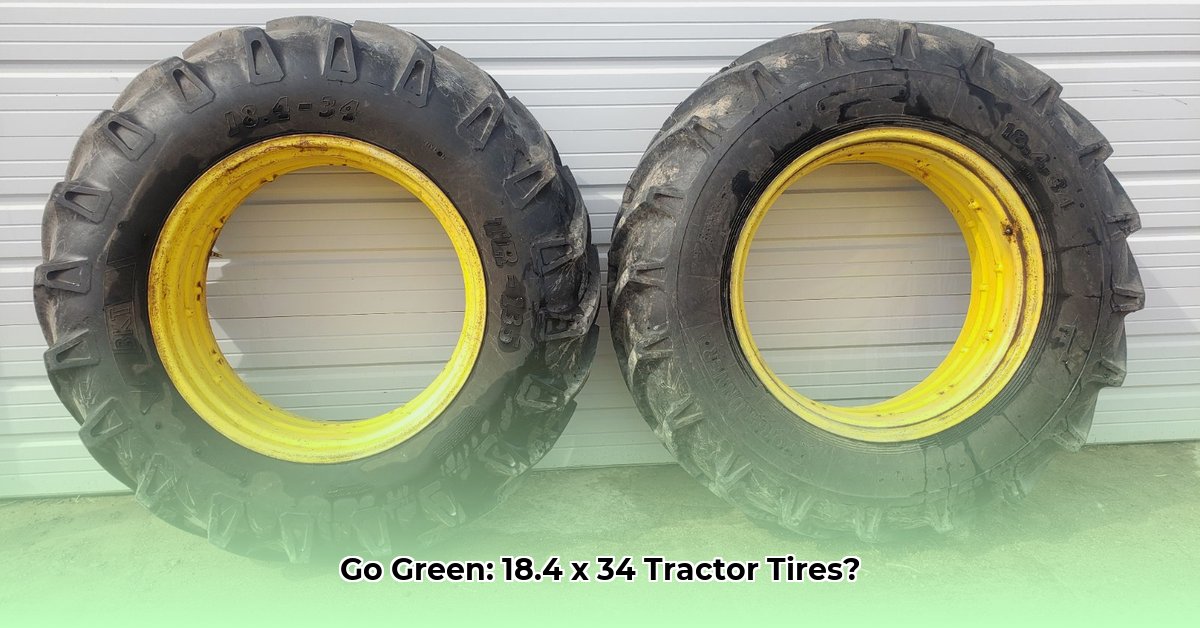
Choosing the right tractor tires might seem like a minor detail, but it significantly impacts your farm's sustainability and profitability. This guide focuses on the common 18.4 x 34 size, explaining how tire selection affects soil health, fuel efficiency, and the environment, and providing a practical guide to choosing the best tires for your operation. For more information on other tire sizes, see this helpful resource on 8.16 R1 tires.
Understanding Soil Compaction: The Silent Thief of Yields
Soil compaction, caused by heavy machinery, is a major concern for farmers. It reduces water infiltration, restricts root growth, and diminishes soil biodiversity, leading to lower yields and increased input costs. Imagine trying to grow crops in a compacted, hard-packed soil—a challenging, if not impossible, task.
Tire Pressure and Technology: Minimizing Compaction's Impact
Tire pressure is a critical factor in soil compaction. High pressure concentrates the weight of the tractor, leading to compaction. Lower pressure distributes the weight over a larger area, minimizing soil disturbance. But pressure alone isn't the solution; tire technology also plays a crucial role.
Wide-Base and Low-Pressure Tires: Innovative Solutions
Wide-base tires (R-1W) distribute weight more effectively than standard tires (R-1), reducing compaction. Low-pressure tires, often radial, take this further, operating at even lower pressures for minimized ground pressure. While the initial cost might be higher, the long-term benefits in terms of fuel efficiency, increased yields, and reduced environmental impact make them a sustainable investment.
Dr. Emily Carter, Agricultural Engineer at Purdue University, states, "Investing in wide-base or low-pressure tires isn't just about tire longevity; it's a long-term investment in the health of your soil and the sustainability of your farming operation. The reduced compaction results in significant improvements."
Choosing the Right 18.4-34 Tractor Tire: A Practical Guide
Selecting the appropriate 18.4-34 tire requires understanding your soil type, farming practices, and budget. Clay soils, for example, benefit from larger contact patches to avoid excessive compaction.
Here's a comparison of tire types:
| Tire Type | Compaction Rating | Pros | Cons |
|---|---|---|---|
| Standard (R-1) | High | Lower initial cost | Higher compaction, reduced fuel efficiency |
| Wide Base (R-1W) | Medium | Reduced compaction, improved fuel efficiency, longer lifespan | Higher initial cost |
| Low Pressure (Radial) | Low | Significantly reduced compaction, best fuel efficiency, longest lifespan | Highest initial cost, requires precise pressure management |
Consider these factors:
- Soil Type: Sandy soils require different tire choices compared to clay soils.
- Farming Practices: No-till farming benefits significantly from low-pressure tires.
- Budget: While initial investment varies, consider the long-term savings in fuel and reduced compaction. A durable tire may require less frequent replacement, even if it’s a higher purchase price.
- Road Usage: Frequent road travel necessitates tires designed for better road performance.
Remember, consulting with an agricultural tire specialist can provide tailored recommendations based on your specific needs.
Sustainable Tire Management: Extending Tire Lifespan and Reducing Waste
Sustainable tire management is vital. Proper tire inflation, according to the manufacturer’s recommendations, is critical for optimal performance and extended lifespan. Regular inspections identify potential problems early, preventing premature failure. Finally, explore responsible tire disposal options, such as recycling programs, to minimize environmental impact.
Investing in a Sustainable Future
Choosing the right 18.4 x 34 tires is an investment in your farm's long-term health and profitability. The initial cost is offset by long-term savings in fuel, reduced fertilizer needs, and minimized soil degradation. It's an environmentally responsible choice, contributing to a more sustainable agricultural future. Your informed decisions today lay the groundwork for a more productive and prosperous tomorrow.